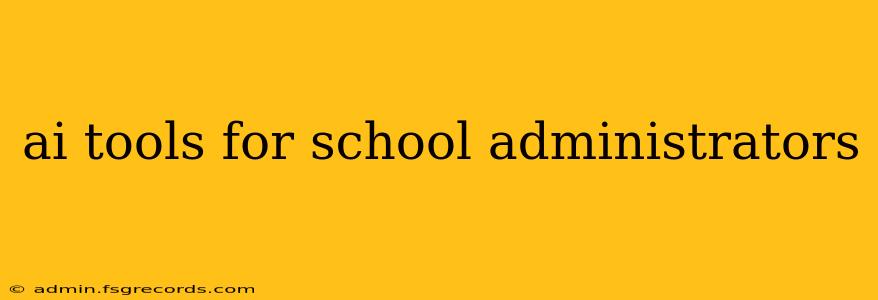School administration is a complex juggling act, demanding efficiency, insightful data analysis, and a laser focus on student success. Fortunately, the rise of artificial intelligence offers powerful tools to help streamline operations and enhance the overall educational experience. This article explores various AI applications specifically designed to assist school administrators in tackling their day-to-day challenges and strategic planning.
AI-Powered Tools for Enhanced Efficiency
School administrators face a constant barrage of administrative tasks. AI tools can significantly alleviate this burden, freeing up valuable time for more strategic initiatives.
1. Automated Scheduling and Resource Allocation:
AI algorithms can optimize class scheduling, minimizing conflicts and maximizing resource utilization (classrooms, teachers, equipment). These systems consider teacher preferences, student needs, and resource availability to generate efficient and equitable schedules. This automation saves countless hours typically spent manually adjusting schedules.
2. Student Support and Early Intervention Systems:
AI-powered platforms can analyze student data (grades, attendance, behavioral patterns) to identify students at risk of falling behind. By flagging potential issues early, administrators can intervene proactively, providing targeted support and preventing academic setbacks. This predictive analytics capability empowers administrators to personalize learning experiences and improve student outcomes.
3. Communication and Collaboration Tools:
AI-driven communication platforms enhance internal and external communication. These tools can automate routine communications, such as sending reminders, announcements, and progress reports to parents and students. They can also facilitate efficient communication among staff members, improving collaboration and coordination.
Leveraging AI for Data-Driven Decision Making
Data analysis is crucial for effective school administration. AI tools provide powerful capabilities to analyze vast amounts of data, extracting actionable insights.
1. Predictive Analytics for Resource Management:
AI can forecast future needs based on historical data and trends. For example, it can predict enrollment numbers, helping administrators allocate resources (staffing, budget) effectively. This proactive approach prevents resource shortages and ensures optimal utilization of funds.
2. Personalized Learning Insights:
AI can analyze student performance data to identify individual learning styles and strengths/weaknesses. This information allows administrators to tailor educational programs and interventions to meet the specific needs of each student, promoting personalized learning and improved academic outcomes.
3. Identifying and Addressing Equity Gaps:
AI can analyze student data to identify and address equity gaps. By analyzing demographic data alongside academic performance, administrators can pinpoint areas where certain student groups are underperforming. This allows for the implementation of targeted interventions to ensure equitable access to education.
Ethical Considerations and Implementation
While the benefits of AI in school administration are significant, ethical considerations must be addressed.
- Data privacy and security: Protecting student data is paramount. Administrators must choose AI tools that prioritize data security and comply with relevant privacy regulations.
- Algorithmic bias: AI algorithms can perpetuate existing biases if not carefully designed and monitored. Administrators must ensure fairness and equity in the use of AI tools.
- Teacher training and support: Successful AI implementation requires adequate training and support for teachers and staff. They need to understand how AI tools work and how to effectively integrate them into their workflows.
Conclusion: Embracing the Future of School Administration
AI tools offer transformative potential for school administrators, improving efficiency, facilitating data-driven decision making, and ultimately enhancing student outcomes. By carefully considering ethical implications and ensuring proper implementation, schools can leverage the power of AI to create a more effective and equitable learning environment for all students. The future of school administration is increasingly intertwined with the capabilities of artificial intelligence, and embracing these tools is crucial for navigating the complexities of modern education.

